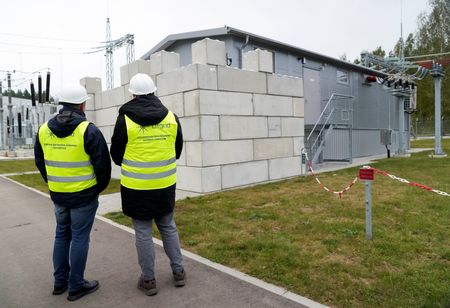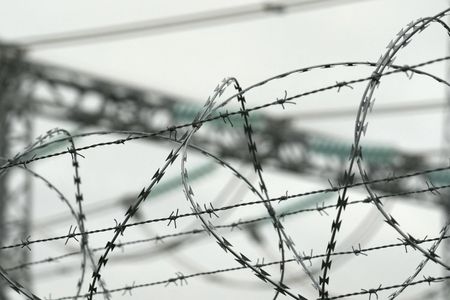By Andrius Sytas and Marek Strzelecki
NERIS SUBSTATION, Lithuania (Reuters) -Four NATO and European Union countries bordering Russia plan to build concrete bunkers and anti-drone nets at vital energy facilities under a plan to protect their power grids following Russian drone incursions.
Violations of Polish airspace by Russian drones this month and multiple drone sightings, including one that forced the closure of Copenhagen Airport for several hours, have raised concerns about NATO's defences on its eastern flank.
The airspace violations have also increased concerns about the vulnerability of energy facilities in the area, and Poland, Lithuania, Estonia and Latvia have drawn up a plan to protect their power grids which they now treat as a matter of urgency.
ENERGY INFRASTRUCTURE IS 'PARTICULARLY EXPOSED'
In interviews with Reuters, the Polish and Lithuanian grid operators provided previously undisclosed details of the plan, including building bunkers to house substations or key parts of substations, using anti-drone nets to cover critical infrastructure and stocking up on hard-to-replace components.
"After the incidents in Copenhagen and elsewhere, there's growing awareness that energy infrastructure is particularly exposed", Grzegorz Onichimowski, CEO of the Polish power grid operator PSE, told Reuters.
"It (the Russian drone violations) is not something that could potentially happen, but something that's already happening".
Days after Russian drones were shot down in Polish airspace by NATO jets on September 9-10, Poland and the three Baltic states submitted the 382-million-euro ($447-million) grid security plan to the EU and asked it to finance half the amount.
The plan had been in the works since March but became more urgent after the airspace violations, Lithuanian and Polish officials said.
"We hope that the European Union, which invested a lot of money, 1.2 billion euros, into preparing our grids to cut ties with Russia, will now properly secure its own investment", Lithuania's Energy Minister Zygimantas Vaiciunas told Reuters.
The three Baltic states completed a switch from Russia's electricity grid to the EU's system in February, severing Soviet-era ties after suspected sabotage of several subsea cables and pipelines.
LESSONS DRAWN FROM RUSSIA'S WAR IN UKRAINE
The grid security plan - on which the Estonian and Latvian grid operators declined comment - draws lessons from Ukraine, whose power grid has been under sustained bombardment since Russia's 2022 invasion.
Much of the focus will be on the so-called Suwalki Gap, a sparsely populated area of Polish territory between Belarus and the Russian exclave of Kaliningrad. The Gap's takeover by Russia would isolate the Baltic states from the rest of NATO.
On Monday, Lithuania installed anti-drone concrete protection at the Neris substation which provides power to the capital Vilnius and is 20 km (12 miles) from the border with Belarus. The concrete blocks will later be tested by having explosives fired at them in a military test range.
Later this year, Lithuania plans to begin producing and assembling bunkers to cover important parts of many of its substations, such as transformers and control rooms, which would be hard to replace.
"We are planning to install these in most of our substations... all of Lithuania feels the proximity (of Russia and Belarus)", said Rokas Masiulis, CEO of Lithuanian grid operator Litgrid. "There are also cyber, electronic and other types of security".
The plan is tailored to protect vital parts of the power grid rather than all of it, as fitting all substations with anti-drone systems would be very costly.
AIMING TO SHOW OTHER STATES 'WHAT CAN BE DONE'
Lithuania wants to stock up on important grid components that could take months to produce or procure, Vaiciunas said.
Ukraine's power grid operator is advising Lithuania on the use of concrete blocks and anti-drone nets, and other ways to secure the infrastructure, Masiulis said.
Lithuania intends to spend 150 million euros on grid security, almost double the amount set out in the plan submitted to the EU, a Litgrid spokesperson said.
"We believe that our projects will be copy-pasted in other countries, we will be able to show others what can be done", Masiulis said.
Poland's PSE meanwhile wants its own armed security unit and helicopters to help protect the link with Lithuania via the Suwalki Gap, company officials said.
(Reporting by Andrius Sytas in Vilnius and at Neris Substation, near Nemencine, Lithuania, and by Marek Strzelecki in Warsaw, Editing by Timothy Heritage)











